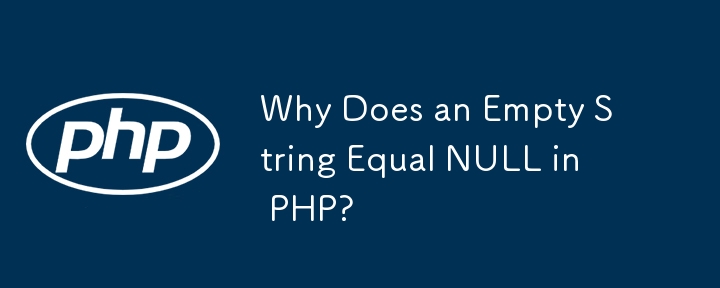Why Does an Empty String Equal NULL in PHP?
Nov 02, 2024 am 02:27 AM
PHP's Unexpected NULL: When Empty Strings Deceive
In PHP, when comparing a variable to NULL using the equality operator ==, it's crucial to understand the subtle behavior that may not align with typical expectations. This is particularly relevant when dealing with empty strings.
Consider the following code:
<code class="php">$a = '';
if ($a == NULL) {
echo 'is null';
}</code>Surprisingly, this code snippet will output "is null", which may seem counterintuitive to someone accustomed to the concept of empty strings being distinct from NULL in most programming languages.
The reason for this behavior lies in the fact that PHP considers NULL equivalent to not only other NULL values but also false, 0, empty strings, and empty arrays when using the == operator. This means that the condition $a == NULL evaluates to true even though $a is an empty string rather than an explicit NULL value.
To rectify this issue and accurately check for NULL specifically, you should switch to using the strict comparison operator ===. This modified code would correctly evaluate to false, avoiding the unexpected "is null" output:
<code class="php">if ($a === NULL) {
echo 'is null';
}</code>Therefore, when seeking to determine whether a variable equals NULL in PHP, employing the === operator is crucial. This distinction ensures precision in your comparisons and prevents any unexpected surprises so that empty strings no longer masquerade as NULL.
The above is the detailed content of Why Does an Empty String Equal NULL in PHP?. For more information, please follow other related articles on the PHP Chinese website!

Hot Article

Hot tools Tags

Hot Article

Hot Article Tags

Notepad++7.3.1
Easy-to-use and free code editor

SublimeText3 Chinese version
Chinese version, very easy to use

Zend Studio 13.0.1
Powerful PHP integrated development environment

Dreamweaver CS6
Visual web development tools

SublimeText3 Mac version
God-level code editing software (SublimeText3)

Hot Topics
 11 Best PHP URL Shortener Scripts (Free and Premium)
Mar 03, 2025 am 10:49 AM
11 Best PHP URL Shortener Scripts (Free and Premium)
Mar 03, 2025 am 10:49 AM
11 Best PHP URL Shortener Scripts (Free and Premium)
 Working with Flash Session Data in Laravel
Mar 12, 2025 pm 05:08 PM
Working with Flash Session Data in Laravel
Mar 12, 2025 pm 05:08 PM
Working with Flash Session Data in Laravel
 Build a React App With a Laravel Back End: Part 2, React
Mar 04, 2025 am 09:33 AM
Build a React App With a Laravel Back End: Part 2, React
Mar 04, 2025 am 09:33 AM
Build a React App With a Laravel Back End: Part 2, React
 Simplified HTTP Response Mocking in Laravel Tests
Mar 12, 2025 pm 05:09 PM
Simplified HTTP Response Mocking in Laravel Tests
Mar 12, 2025 pm 05:09 PM
Simplified HTTP Response Mocking in Laravel Tests
 cURL in PHP: How to Use the PHP cURL Extension in REST APIs
Mar 14, 2025 am 11:42 AM
cURL in PHP: How to Use the PHP cURL Extension in REST APIs
Mar 14, 2025 am 11:42 AM
cURL in PHP: How to Use the PHP cURL Extension in REST APIs
 12 Best PHP Chat Scripts on CodeCanyon
Mar 13, 2025 pm 12:08 PM
12 Best PHP Chat Scripts on CodeCanyon
Mar 13, 2025 pm 12:08 PM
12 Best PHP Chat Scripts on CodeCanyon
 Announcement of 2025 PHP Situation Survey
Mar 03, 2025 pm 04:20 PM
Announcement of 2025 PHP Situation Survey
Mar 03, 2025 pm 04:20 PM
Announcement of 2025 PHP Situation Survey








